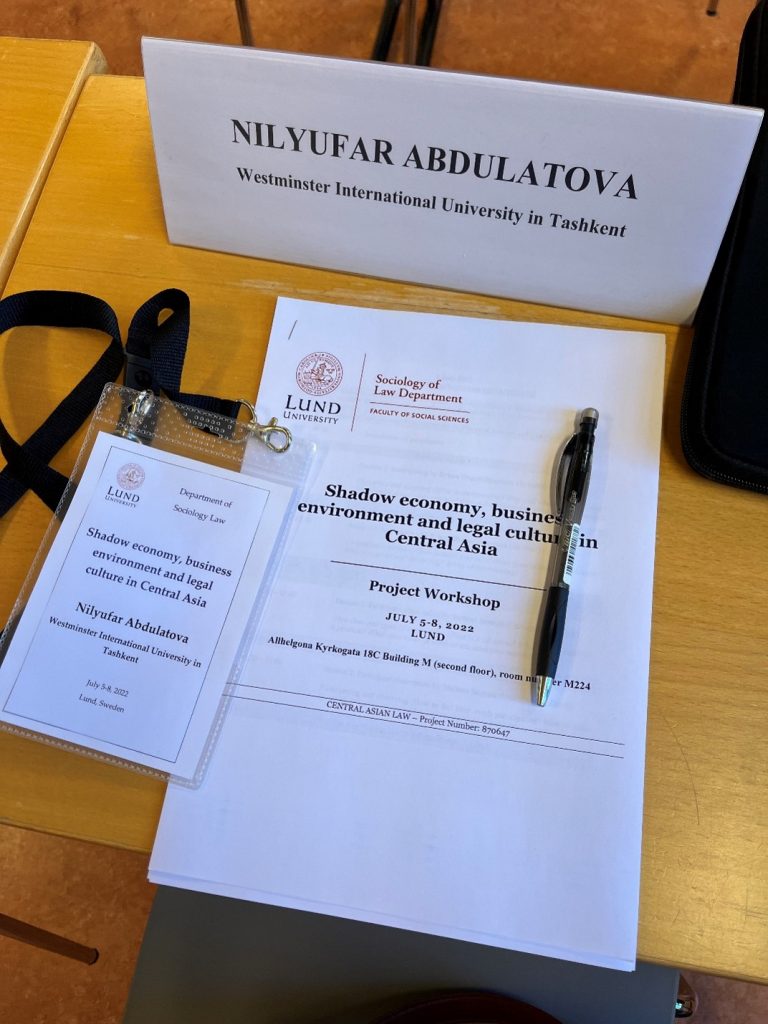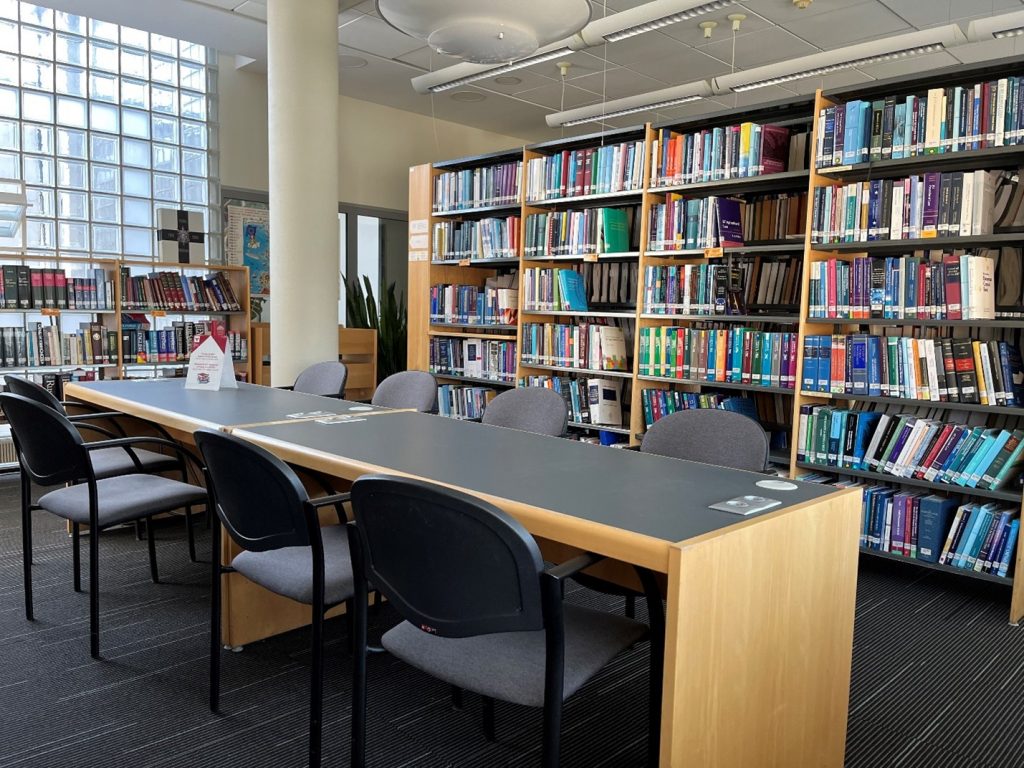by Nilyufar Abdulatova, Lecturer in Law (Westminster International University in Tashkent)
“Research is creating new knowledge.”
(Neil Armstrong)
Experience to share

This time the secondment started with a fruitful workshop hosted by Lund University in Sweden. During the workshop, my project colleagues and I exchanged our research experiences. Moreover, I had a chance to attend a series of lectures on different research methods performed by senior colleagues. Besides the classes, we have been divided into several research streams, where I received precious comments and feedback on my research paper.
After collecting the feedback on my research and being inspired by the workshop vibes, I headed to the Riga Graduate School of Law in Riga, Latvia. This summer, I spent in Riga and dedicated my research time to exploring and learning about Latvia’s good governance on natural resource management. Even though Latvia is not a natural resource giant, it still heavily depends on fossils import. Thus, I concentrated my research on studying these legal tools and mechanisms based on the national laws of Latvia and the EU Law. The facilities provided by my Latvian colleagues (RGSL) contributed a lot to my research.

Experience to learn
Law of EU
During the research, several interviews have been conducted to be analyzed and reflected in the forthcoming paper. Moreover, the key findings have been applied through legal research methods (normative approach).
From the beginning, the EU moved towards economic development and social prosperity, reflected in its applicable core treaties. The Treaty on European Union (hereafter TEU) states: “The Union shall work for the sustainable development of Europe based on balanced economic growth and price stability, a highly competitive social market economy, aiming at full employment and social progress, and a high level of protection and improvement of the quality of the environment.” In the commentaries to the TEU, the concept of ‘sustainable development has been identified as “intergenerational equity”, i.e., responsibility for future generations. The Treaty on the Functioning of the European Union (hereafter TFEU), in its turn, reaffirms a need for an inclusive legal framework to enhance sustainability, especially in environmental and energy areas, since they are related not only to the economic aspect but also with social well-being and climate change issues. Article 191 says that the EU contributes to achieving the “preserving, protecting and improving the quality of the environment; protecting human health; prudent and rational utilization of natural resources and promoting measures at an international level to deal with regional or worldwide environmental problems, and in particular combating climate change.”
Moreover, Art. 194 states that the EU’s energy policy aims “to ensure the security of energy supply in the EU and to promote energy efficiency and energy saving and the development of new and renewable forms of energy”. As mentioned earlier in this paper, most of European energy companies operate in resource-rich countries outside of the EU. This fact shows that the EU should call undertakings listed in the EU to comply with the EU’s acquis on sustainable development. This, in turn, gives rise to the thought that there is always a big challenge to achieve sustainable development without strengthening good governance in the energy sector. To comply with the principle of transparency of good governance in the extractive industries, the EU developed new legal requirements to trace related information on certain types of businesses listed in the EU. In 2013, the EU came to a result with the Directive on disclosure of financial information, which has been amended with the Directive on disclosure of non-financial information by certain types of undertakings and groups. Implementing modified legal mechanisms to disclose financial and non-financial information of energy companies shows the EU’s support for improving good governance in the extractive industries sector.
After the adoption of Directive 2013/34/EU, all member states of the EU had an obligation to implement legal and administrative regulations necessary for compliance with the Directive within a specified period. According to the EU approach, “large undertakings and public-interest entities which are active in the extractive industry or logging of primary forests” should report on material payments made to governments in the hosting states on an annual basis. By undertakings, the EU means companies “listed in the EU with any activity involving the exploration, prospection, discovery, development, and extraction of minerals, oil, natural gas and logging in the EU or third country.” These particular types of undertakings are obliged to report on financial and non-financial information (discussed in detail below) to the governments on a “country-by-country” method.
Directive 2013/34/EU has defined “government” as any national, regional, or local authority of a Member State or a third country. Once again, the author wants to maintain that the EU legal framework on financial and non-financial disclosure of revenues coming from the extractive industries and logging is a comprehensive instrument to convert EITI’s volunteer regime to mandatory for countries that still do not join the EITI.
Latvia’s approach
Briefly, Latvia’s legislation on stretching good governance in the energy sector consists of several legal tools. Some of them will shortly be listed in this post. The first one is the Energy Law of Latvia, which states that the Minister of Economics is responsible for the energy industry and, according to this Law, should perform the following functions: managing the development of draft laws and regulations for the implementation of the national energy policy, promoting the efficient and economical use of energy sources supplied to energy users, promoting the attraction of investments to the energy industry, and also to the renovation and construction of the facilities of energy supply merchants and others;
The second component to overview is the Electricity Market Law of Latvia. This Law aims to establish prerequisites for the operation of an efficiently functioning electricity market and to promote energy independence, ensuring different suppliers of energy resources necessary for electricity generation, which is directly connected to maintaining good governance in the energy sector. And the third element of relevant legislation of Latvia, which got my attention is the Law On Regulators of Public Utilities prescribes the general procedure for regulating public utilities and basic principles for the development and operation of the regulatory system.
A thoughtful analysis would conclude that substantial evidence highlights the importance of learning, analyzing, and sharing the experience of different topics among Central Asia and EU states. Thus, I want to thank the project team for creating these research opportunities to learn and share!

